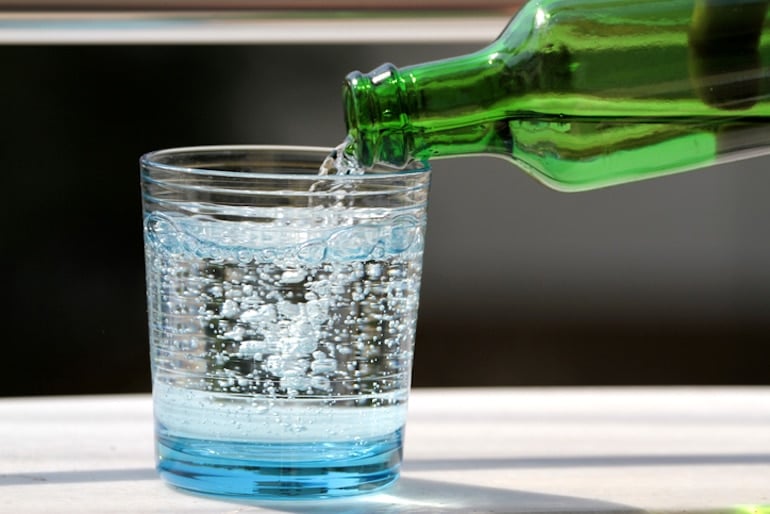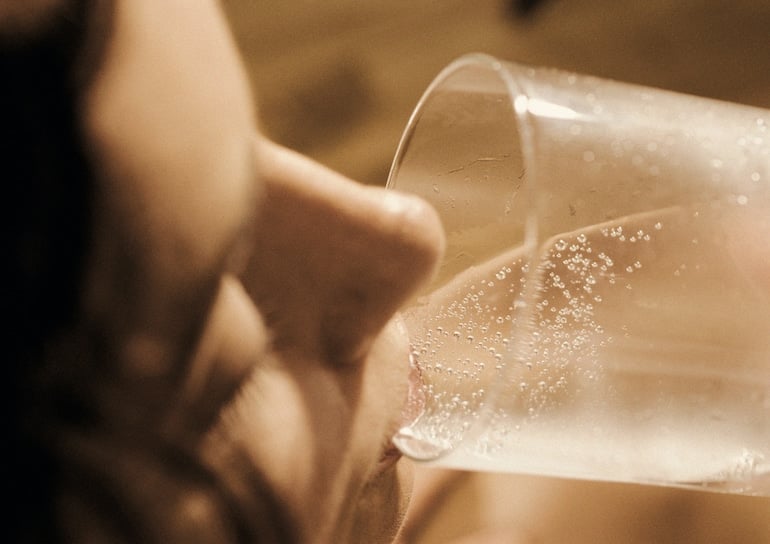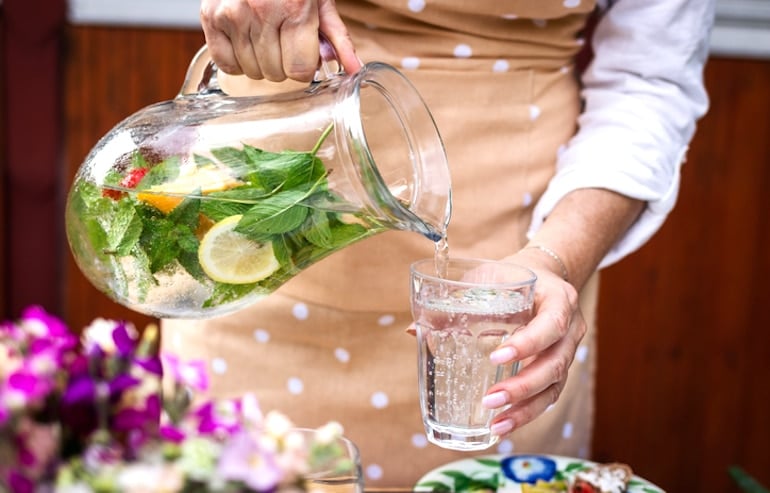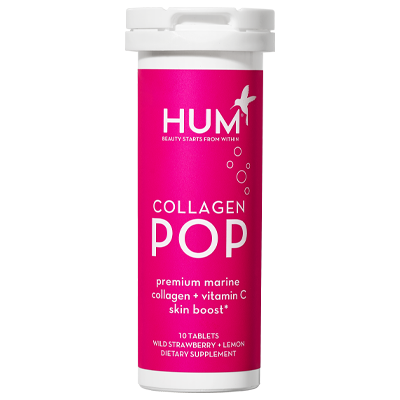THE WELLNEST • Food • Healthy Eating
Is Carbonated Water Actually Good for You? A Dietitian Answers
By Jessica Nelson, RDN, CPT •
June 28, 2021
Is carbonated water good or bad for you? Jessica Nelson, RDN, CPT, investigates.
Carbonated water—and seltzer in particular—is exploding in popularity. In fact, this market is one of the fastest growing non-alcoholic beverage categories today.
In 2018, $22.1 billion in sparkling water/seltzers were sold. Annually since then, this figure has only increased. By the end of 2021, the projected market value rings in at $33.46 billion.
All things considered, you may wonder: Is carbonated water healthy? Here, we’ll explore the benefits of carbonated water, what to look out for, and more.
 Many popular brands—like La Croix, bubly, Spindrift, Sparkling Ice, and Perrier—define their beverages as “sparkling water.” However, there’s really no difference between that term and the word “seltzer.”
Companies do this since there’s no FDA regulation on identifying the difference when it comes to soft drinks. In fact, there’s little regulation on carbonated waters, with the exception of sparkling mineral water.
The FDA sets Good Manufacturing Practices (GMP) for carbonated water for additives, contact substances, and nutrition labeling. However, carbonated waters have no quality testing regulation and no set limits on contaminants, unlike bottled water.
Many popular brands—like La Croix, bubly, Spindrift, Sparkling Ice, and Perrier—define their beverages as “sparkling water.” However, there’s really no difference between that term and the word “seltzer.”
Companies do this since there’s no FDA regulation on identifying the difference when it comes to soft drinks. In fact, there’s little regulation on carbonated waters, with the exception of sparkling mineral water.
The FDA sets Good Manufacturing Practices (GMP) for carbonated water for additives, contact substances, and nutrition labeling. However, carbonated waters have no quality testing regulation and no set limits on contaminants, unlike bottled water.


What is carbonated water?
Before we dive in, let’s start by understanding what carbonated water is. Simply put, it’s water that’s infused with carbon dioxide gas, under pressure, to produce small bubbles. Then, several different kinds of carbonated water fall within this beverage category. Different types include the likes of:- club soda
- tonic water
- sparkling mineral water
- seltzer (aka sparkling water)
 Many popular brands—like La Croix, bubly, Spindrift, Sparkling Ice, and Perrier—define their beverages as “sparkling water.” However, there’s really no difference between that term and the word “seltzer.”
Companies do this since there’s no FDA regulation on identifying the difference when it comes to soft drinks. In fact, there’s little regulation on carbonated waters, with the exception of sparkling mineral water.
The FDA sets Good Manufacturing Practices (GMP) for carbonated water for additives, contact substances, and nutrition labeling. However, carbonated waters have no quality testing regulation and no set limits on contaminants, unlike bottled water.
Many popular brands—like La Croix, bubly, Spindrift, Sparkling Ice, and Perrier—define their beverages as “sparkling water.” However, there’s really no difference between that term and the word “seltzer.”
Companies do this since there’s no FDA regulation on identifying the difference when it comes to soft drinks. In fact, there’s little regulation on carbonated waters, with the exception of sparkling mineral water.
The FDA sets Good Manufacturing Practices (GMP) for carbonated water for additives, contact substances, and nutrition labeling. However, carbonated waters have no quality testing regulation and no set limits on contaminants, unlike bottled water.
Types of Carbonated Water
From a nutritional standpoint, here’s what differentiates the various types of carbonated water.Club Soda
Club soda has added minerals like potassium sulfate, sodium chloride, disodium phosphate, and sodium bicarbonate.Tonic Water
Tonic water has minerals as well as the compound quinine, which provides its bitter taste.Sparkling Mineral Water
Sparkling mineral water is naturally carbonated from spring water. True to its name, it’s a natural source of minerals including sodium, magnesium, and calcium.Seltzer (aka Sparkling Water)
Seltzer doesn’t naturally contain minerals. Additionally, it commonly contains ingredients such as sugar, juice, and/or artificial sweeteners for added flavor.
So, is carbonated water good for you?
At the end of the day, carbonated water is a healthy, good-for-you beverage. Here’s a closer look at the benefits of carbonated water.It’s Just as Hydrating as Water
Perhaps one of the most common FAQs about carbonated water is this: Is it as hydrating as regular water? It turns out the answer is yes. A 2015 study in the American Journal of Clinical Nutrition found that, compared to plain water, it’s no different in how it hydrates the body. That said, we all could benefit from drinking more bubbles if it helps us stay hydrated. This fact rings especially true for those who don’t love the taste of water and/or fail to meet their daily fluid needs.It’s a Healthier Alternative to Other Beverages
Many types of carbonated water contain zero sugar. This makes them a healthier alternative to manufactured juices, sports drinks, energy drinks, and regular sodas. Of course, drinking each of these beverages is fine in moderation. However, when it comes to staying hydrated throughout the day, zero-calorie or no-added-sugar drinks (like sparkling water) are preferable options.It May Aid Digestion
Gas and bloating are natural side effects of sipping on drinks with bubbles. But can these beverages actually make your stomach feel better—or worse? Honestly, the existing research isn’t so clear. To begin, some literature suggests that carbonated water may actually people who experience digestive issues. One 2009 review of studies found that it may help improve indigestion and constipation, as well as promote early satiety.…Or It May Not
Experience more intense and ongoing digestive issues such as IBS or acid reflux? If so, you’ll likely want to limit your intake of seltzer and other carbonated drinks. Drinking over 10 ounces of carbonated water daily can potentially exacerbate symptoms of reflux.
What to Watch Out For
Finally, when it comes to how healthy carbonated water is for you, there are potential cons when it comes to additives. Some seltzers and associated drinks contain ingredients such as:- sodium
- caffeine
- citric acid
Sodium
The sodium content in carbonated beverages is typically low. By nutrition labeling standards, it’s considered low sodium (140 milligrams or less per serving) to very low sodium (35 milligrams or less per serving). If you need monitor your sodium intake for health reasons, just be aware that carbonated water is a potential source of extra sodium.Caffeine
The caffeine content in certain carbonated drinks is likely no more than the amount in a Coke or Pepsi can, which is about 35 milligrams. However, caffeine can irritate reflux. Therefore, if you have acid reflux and/or are sensitive to caffeine, use caution when drinking seltzer and the like.Citric Acid
Lastly, manufacturers add citric acid to tons of foods and drinks, such as soda. It even exists naturally in foods like fruit. It’s important to be mindful of your citric acid intake, as it may contribute to the erosion of tooth enamel. Those with dental health issues should be especially cautious.The Bottom Line
At the end of the day, carbonated water is good for you. In sum, it quenches your thirst just as well as water to keep you hydrated throughout the day. Seltzers and other types of carbonated water pose few drawbacks and taste great, which is why it gets this dietitian’s stamp of approval.More like this









